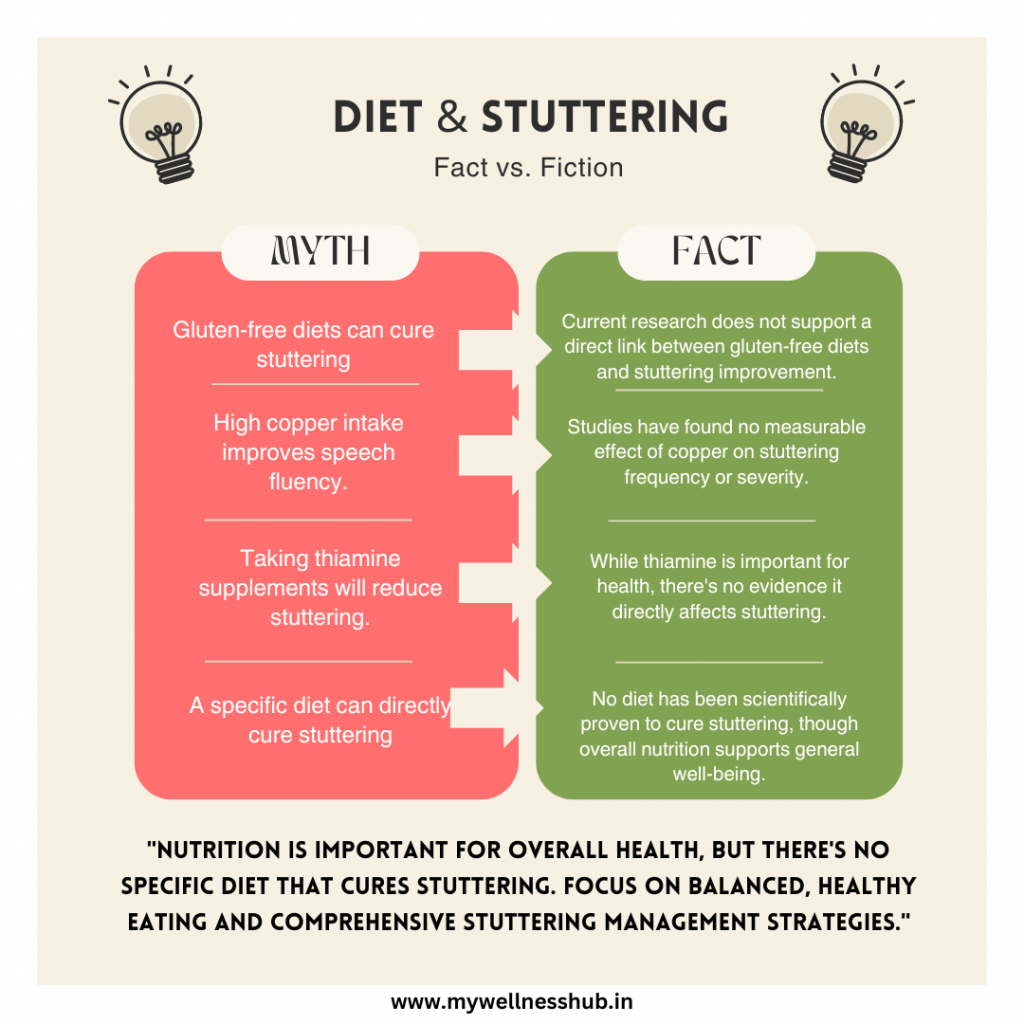Is There a Dietary Cure for Stuttering?
By Rajini D
Last Updated: March 14, 2024
Have you ever found yourself pondering the complexities of speech and how it varies so widely among us? Stuttering, a speech disorder that disrupts the flow of one’s speech, can be particularly challenging, affecting not only communication but also self-esteem and social interactions. Imagine the frustration of wanting to express yourself clearly, only to find the words just won’t come out smoothly. This is the daily reality for many individuals living with stuttering.
In our quest for solutions and better understanding, a common and intriguing question arises: Can our diet influence stuttering? It’s a topic that has piqued the interest of many, from those who stutter to speech therapists and researchers. The idea that what we eat could potentially impact our speech is both fascinating and hopeful. After all, if diet plays a role, could modifying it offers a path to smoother speech?
Understanding Stuttering
Stuttering, often perceived as a simple hiccup in speech, is far more complex than it seems. This condition involves frequent interruptions in the flow of speech, characterized by repetitions, prolongations, or complete blocks. These disruptions can vary in frequency and intensity from day to day, making stuttering a puzzle for both those who experience it and the professionals who seek to understand it. The roots of stuttering are multifaceted, intertwining genetics, neurophysiology, and environmental factors, thereby presenting a unique challenge for each individual affected.
Also read: What is Stuttering: Types, Symptoms, and Causes

The Quest for Dietary Solutions
The intriguing possibility that diet could influence stuttering has captured the attention of both individuals living with stuttering and researchers alike. Anecdotal reports and preliminary research have sparked a growing interest in this area, suggesting that what we eat might play a role in managing stuttering. This hypothesis stems from a broader understanding of how nutrition impacts our overall health, including brain function and neurotransmitter activity, which are critical in speech production. As the search for effective treatments continues, the exploration into dietary interventions represents a hopeful avenue for those seeking new solutions.
The Science Speaks: Investigating the Dietary Link
Recent investigations into the potential relationship between diet and stuttering, particularly focusing on the intake of copper and thiamine, have shed light on a complex issue. Despite the theoretical underpinnings that suggest a connection between certain dietary elements and stuttering improvement, scientific evidence remains scarce. Studies, including a noteworthy pilot study, have not found significant proof that alterations in copper or thiamine consumption directly influence stuttering frequency or severity. However, these studies did uncover an interesting facet: a correlation between mood states and fluency. This suggests that while the direct impact of diet on stuttering might be minimal, the overall influence of nutritional health on emotional well-being and, subsequently, speech fluency cannot be overlooked.
Know more: Speech and Language Milestones: 0 to 12 Months

The Role of Nutrition in Overall Well-being
Understanding the subtle nuances between diet and stuttering leads us to a broader, undeniable truth: the integral role of nutrition in maintaining overall health. A balanced diet, rich in vitamins, minerals, and essential nutrients, supports brain health and emotional stability and, by extension, could influence speech fluency indirectly through improved mood states. WellnesHub advocates for the importance of a well-rounded diet not just as a potential avenue to explore stuttering management but as a cornerstone of a healthy lifestyle. Encouraging a balanced nutritional intake is part of our commitment to helping individuals achieve their best health, recognizing that while diet might not be a direct cure for stuttering, it plays a crucial role in the holistic well-being of everyone.
Nutritional Guidelines for Overall Well-being
| Nutrient | Benefits | Food Sources |
|---|---|---|
| Vitamins | Boosts immune system, supports normal vision and skin health | Fruits, vegetables, nuts, dairy |
| Minerals | Strengthens bones, improves cardiovascular health | Leafy greens, nuts, seeds, whole grains |
| Fiber | Aids digestion, supports healthy bowel movements | Whole grains, beans, lentils, berries |
| Protein | Builds and repairs tissues support muscle health | Lean meats, dairy products, legumes |
| Healthy Fats | Supports brain function, helps maintain healthy skin and eyes | Avocados, nuts, seeds, olive oil |
Beyond Diet: Comprehensive Stuttering Management
While diet plays a crucial role in overall health, the management of stuttering extends beyond nutritional considerations. Recognizing stuttering as a multifaceted issue means embracing a holistic approach to its treatment. This includes exploring a variety of strategies that address both the physical and emotional components of stuttering.
Speech Therapy:
One of the most effective tools in the management of stuttering is speech therapy. Tailored to meet individual needs, speech therapy can help improve fluency through a range of techniques and exercises designed by speech-language pathologists.
Explore more: Best Online Speech Therapy in Hyderabad
Psychological Support:
The emotional impact of stuttering cannot be overstated. Psychological support, whether through therapy or support groups, provides a safe space for individuals to express their feelings and challenges, fostering a sense of community and understanding.
Stress Management Techniques:
Techniques such as mindfulness and yoga have shown promise in reducing the stress and anxiety that can exacerbate stuttering. These practices encourage relaxation, improve breathing patterns, and enhance overall well-being, contributing to smoother speech.
Know more: Oral Motor Exercises: Improve Soft Palate Sensations
Stress Management Techniques and Their Benefits
| Technique | Description | Benefits |
|---|---|---|
| Yoga | A physical, mental, and spiritual practice that combines postures, breathing exercises, and meditation. | Reduces stress, improves flexibility and balance, enhances mental focus |
| Mindfulness | The practice of being present and fully engaged with whatever we’re doing at the moment, free from distraction or judgment. | Enhances self-awareness, reduces stress and anxiety, improves concentration |
| Deep Breathing | A technique that involves consciously taking slow, deep breaths to trigger the body’s relaxation response. | Lowers stress levels, reduces anxiety, improves oxygen delivery to cells |
| Progressive Muscle Relaxation | A technique that involves tensing and then slowly releasing each muscle group in the body to relax the muscles and mind. | Reduces stress, eases muscle tension, helps with sleep disturbances |
| Meditation | A practice where an individual uses a technique, such as focusing the mind on a particular object, thought, or activity, to achieve a mentally clear and emotionally calm state. | Increases self-awareness, reduces stress, promotes emotional health |
Embracing a holistic approach means acknowledging the complexity of stuttering and recognizing that effective management likely involves a combination of strategies. This approach aligns with the philosophy at Wellness Hub, where we advocate for comprehensive wellness strategies that cater to the whole person — body, mind, and spirit. While our primary focus might not be on stuttering, our commitment to promoting overall well-being through various health and wellness practices supports every individual’s journey toward improved health, including those navigating the challenges of stuttering.
By integrating these diverse strategies into a comprehensive management plan, individuals living with stuttering can find not only improvement in their speech but also an enhanced sense of control and confidence in their daily lives.
Conclusion
Throughout this exploration, we’ve delved into the complex relationship between diet and stuttering, uncovering that while no direct dietary cure exists, the role of a healthy lifestyle cannot be overstated. The science has spoken: nutrients like copper and thiamine, though crucial for health, do not directly influence stuttering. However, the broader picture of well-being—encompassing a balanced diet, psychological support, and stress-reducing practices—plays a pivotal role in managing stuttering within a holistic care framework.
This journey towards smoother speech is personal and unique, echoing the diverse experiences of those who stutter. At Wellness Hub, we stand by you, advocating for a comprehensive approach to wellness that integrates physical, emotional, and mental health strategies. Your path to empowerment may involve exploring various methods, from traditional speech therapy to innovative dietary adjustments. Remember, every step forward is a step toward reclaiming your voice and confidence in a world that awaits your contributions.
Frequently Asked Questions:
1. Can diet cure stuttering?
While current research does not support a direct dietary cure for stuttering, maintaining a balanced and healthy diet is crucial for overall well-being, which can indirectly influence the management of stuttering.
2. What role does nutrition play in managing stuttering?
Nutrition plays a significant role in overall health and well-being. Although no direct link has been found between specific nutrients and the improvement of stuttering, a healthy diet may contribute to better management of the condition as part of a holistic approach.
3. Are there any specific foods that can worsen stuttering?
No direct evidence suggests specific foods can worsen stuttering. However, individuals may find that certain foods, especially those they are allergic to or intolerant of, might exacerbate their symptoms due to overall discomfort or anxiety.
4. How can I manage my stuttering effectively?
Effective stuttering management often requires a holistic approach, including speech therapy, psychological support, stress management techniques like mindfulness and yoga, and maintaining a healthy lifestyle.
5. Can stress management techniques improve stuttering?
Yes, stress management techniques such as mindfulness and yoga can help reduce stress and anxiety levels, which may contribute to the severity of stuttering. These practices can be a valuable part of a comprehensive stuttering management plan.
6. Where can I find support and resources for managing stuttering?
Wellness Hub offers a range of resources and support for individuals looking to manage stuttering as part of their journey toward better health and well-being. From articles on holistic health practices to tips on nutrition and stress management, our platform is dedicated to supporting your wellness journey.
7. Does speech therapy work for everyone with stuttering?
Speech therapy is a highly effective treatment for many individuals with stuttering, offering tailored strategies and exercises to improve fluency. However, its effectiveness can vary among individuals, depending on various factors, including the severity of stuttering, the person’s age, and their commitment to the therapy process.
8. Is there a genetic component to stuttering?
Yes, research indicates that stuttering has a genetic component, with many individuals who stutter having a family member who also stutters or has stuttered. This genetic predisposition suggests that stuttering is influenced by a combination of genetic and environmental factors.
9. Can lifestyle changes reduce the severity of stuttering?
Lifestyle changes that promote overall health and reduce stress, such as regular exercise, a balanced diet, and adequate sleep, can contribute to a reduction in the severity of stuttering for some individuals. These changes support general well-being and can improve the effectiveness of other stuttering management strategies.
10. How can I support someone who stutters?
Supporting someone who stutters involves showing patience, listening attentively without interrupting, and providing encouragement and understanding. It’s also helpful to educate yourself about stuttering to dispel common myths and understand the challenges faced by those who stutter.
About the Author:
Rajini Darugupally
M.Sc., Speech-Language Pathologist (9+ years of experience)
Rajini is a passionate and dedicated Speech-Language Pathologist with over 9+ years of experience, specializing in both developmental speech and language disorders in children and rehabilitation in adults. Driven by a desire to empower each individual to find their voice, Rajini brings a wealth of experience and a warm, genuine approach to therapy.
Currently, at Wellness Hub, she thrives in a team environment that values innovation, compassion, and achieving results for their clients.
Connect with Rajini to learn more about how she can help you or your loved one find their voice.
Book your Free Consultation Today
Parent/Caregiver Info:
Client’s Details:
* Error Message








